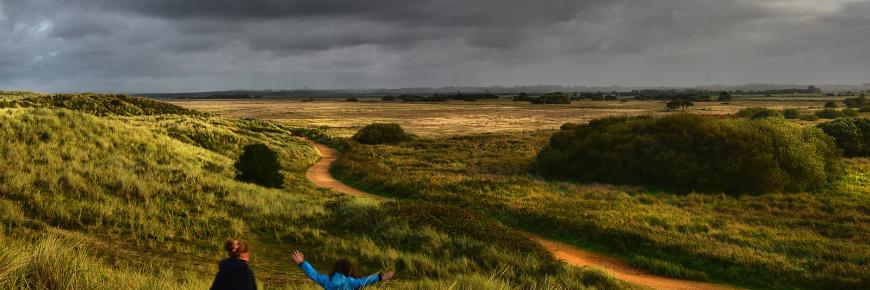New solutions for dune resilience
One of three strands of the ENDURE project, the ‘New Solutions for Dune Resilience’ scheme has aimed to improve the natural ability of dunes to protect the coast from flooding and erosion.
Across the climate change is causing sea level rise by 2-4 millimetres per year, and of up to 15 square kilometres each year. Although it does not sound like that much, a few mm of sea level rise each year increases risk of flooding significantly. In the long term, this means many people will have to move and entire coastal towns may have to be given up if nothing is done to contain and to adapt to sea level rise. It will also affect essential infrastructure situated on the coastline, such as harbours and power plants. Industry and property important to EU economies are therefore also at risk from the impacts of climate change.
Natural coastal can provide resilient protection against the advances of the sea.
By maintaining and protecting not just the dunes, but also the plants and animals that live in the coastal area, a healthy ecosystem high in is ensured. This is important, for example because dunes cannot function without plants such as marram grass which keep the sand in place: if this plant declines, the dunes would be swept away by the wind much too easily. But in order for marram grass to thrive, other animal and plant life must flourish in the landscape as well. By protecting coastal nature, natural dune resilience against flooding is thus improved. The idea to use natural barriers such as dunes, also called ‘soft’ interventions, to protect against flooding is quite new. Traditionally, it was more common to build ‘hard’ defences, such as seawalls, dams and dikes. In the context of climate change, such interventions are however not viable as the only solution in the long term: they are more costly and often have negative effects on the nature in coastal areas. But soft solutions do not yet receive the same attention as these more traditional interventions: ENDURE has carried out pilot projects researching such soft solutions and raising awareness on their importance.
Through conducting 3 pilot studies ENDURE has demonstrated and tested affordable and to improve dune resilience to the effects of climate change mentioned above. This has expanded the coastal dune management options available to such as managers, land owners, government agencies, local and regional authorities. These stakeholders all have a role in coastal management and have benefited from the learning and results being shared from the pilot studies carried out by ENDURE. The project has thus increased stakeholders’ capacity and has offered them alternatives to traditional .
The project partner CEREMA in France was the leading partner on this strand of the project, with input from all partners.
2 Seas area
2 Seas or Two Seas area: From the Isles of Scilly to Norfolk in England and from Somme to Texel on the continental side, the Interreg 2 Seas area covers both rural and urban territories. It represents the following areas
England - South-West, South-East and East of England
France - Departments of Nord, Pas de Calais, Somme and Aisne
Belgium (Flanders) - Provinces of West-Flanders, East-Flanders and Antwerp
The Netherlands - Province of Zeeland and the coastal areas of the Provinces of Zuid-Holland, Noord-Holland and Noord-Brabant.
Erosion losses
Erosion losses: the amount of land (in the form of sediment and sand taken by the sea) that is lost due to coastal erosion. 15 km2 of loss each year may not sound like so much across the four countries, but this is a loss of an area as big as over 2800 football fields. If this were to continue year after year without intervention, enormous amounts of land would be lost.
Ecosystem
Ecosystem: a biological community of interacting organisms and their physical environment.
Biodiversity
Biodiversity: A term used to describe the biological variety of life on Earth. When an ecosystem is high in biodiversity, it means many different kinds of plants and animals live there. Climate change threatens biodiversity, leading to a decline in nature and even to extinction of species.
Durable Ecosystem-based Methods
Durable ecosystem-based methods: another term for soft solutions to the effects of climate change is nature-based or ecosystem-based solutions. These terms refer to the fact that these measures employ the way an ecosystem functions naturally as part of policies against flooding. The durability of these measures means that they have a lasting effect in the long term without becoming too expensive or labour-intensive.
Stakeholder
Stakeholder(s): this term refers to any party (be it an organisation, company, government) who has something to benefit from the project.
Hard engineering interventions
‘Hard’ engineering interventions rely on man-made structures such as concrete seawalls as the primary policy against flooding.

